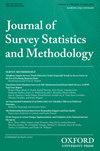隐含作为工具变量:一种利用概率匹配数据进行估计和推理的方法
IF 1.6
4区 数学
Q2 SOCIAL SCIENCES, MATHEMATICAL METHODS
引用次数: 1
摘要
概率匹配数据集中的连锁误差可能导致回归系数估计中的偏差。本文提出了一种获得一致估计和有效推理的方法,该方法依赖于工具变量。该方法的新颖性在于表明,工具变量在概率记录链接过程中自然产生,从而允许现成的实现。相对于现有方法,工具变量方法不需要整合记录链接和回归分析步骤,不需要估计链接误差的复杂模型,也不需要估计标准误差的计算成本高昂的方法。工具变量方法在突出多对一链接问题的环境的蒙特卡罗模拟中表现良好。本文章由计算机程序翻译,如有差异,请以英文原文为准。
Implicates as Instrumental Variables: An Approach for Estimation and Inference with Probabilistically Matched Data
Linkage errors in probabilistically matched data sets can cause biases in the estimation of regression coefficients. This article proposes an approach to obtain consistent estimates and valid inference that relies on instrumental variables. The novelty of the method is to show that instrumental variables arise naturally in the course of probabilistic record linkage thereby allowing for off-the-shelf implementation. Relative to existing approaches, the instrumental variable approach does not require integration of the record linkage and regression analysis steps, the estimation of complex models of linkage error, or computationally expensive methods to estimate standard errors. The instrumental variables approach performs well in Monte Carlo simulations of an environment highlighting a many-to-one linkage problem.
求助全文
通过发布文献求助,成功后即可免费获取论文全文。
去求助
来源期刊
CiteScore
4.30
自引率
9.50%
发文量
40
期刊介绍:
The Journal of Survey Statistics and Methodology, sponsored by AAPOR and the American Statistical Association, began publishing in 2013. Its objective is to publish cutting edge scholarly articles on statistical and methodological issues for sample surveys, censuses, administrative record systems, and other related data. It aims to be the flagship journal for research on survey statistics and methodology. Topics of interest include survey sample design, statistical inference, nonresponse, measurement error, the effects of modes of data collection, paradata and responsive survey design, combining data from multiple sources, record linkage, disclosure limitation, and other issues in survey statistics and methodology. The journal publishes both theoretical and applied papers, provided the theory is motivated by an important applied problem and the applied papers report on research that contributes generalizable knowledge to the field. Review papers are also welcomed. Papers on a broad range of surveys are encouraged, including (but not limited to) surveys concerning business, economics, marketing research, social science, environment, epidemiology, biostatistics and official statistics. The journal has three sections. The Survey Statistics section presents papers on innovative sampling procedures, imputation, weighting, measures of uncertainty, small area inference, new methods of analysis, and other statistical issues related to surveys. The Survey Methodology section presents papers that focus on methodological research, including methodological experiments, methods of data collection and use of paradata. The Applications section contains papers involving innovative applications of methods and providing practical contributions and guidance, and/or significant new findings.

 求助内容:
求助内容: 应助结果提醒方式:
应助结果提醒方式:


